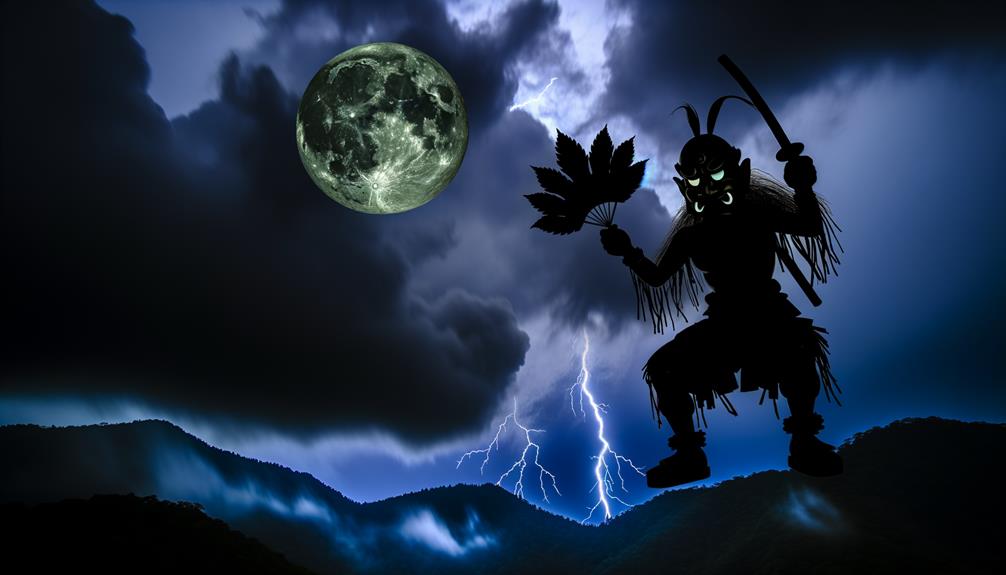Imagine being in Japan's pristine, sacred mountains, far from the hustle and bustle of its vibrant city streets. This is where you'd find the Tengu, mythical warrior spirits, according to traditional stories. These characters from ancient tales are seen as a mix of threat and teacher, known for their mischief but also respected for their fighting skills. As a researcher, I've come to see the Tengu not just as figures from old stories, but as representations of human contradictions—they're impulsive yet reflective, worldly yet otherworldly, playful yet perilous. These spirits, with their avian looks and extraordinary abilities, have intrigued many over the years, making a lasting impact on Japan's cultural identity. But what makes us so drawn to these legendary beings, and what can they reveal about our own character? This is a story that's definitely worth digging into.
Origins and Evolution of Tengu

The Tengu, an intriguing figure in Japanese folklore, has a fascinating origin story. It begins in China, where they were originally seen as celestial dogs. Their journey to Japan resulted in a dramatic transformation – these spiritual warriors morphed into bird-like beings, before taking on human features, characterized by red faces and long noses.
The Tengu's symbolism is rich and multifaceted. They're known to meddle with Buddhist monks, embodying disorder and rebellion. This paints a picture of their complex role in Japanese culture.
Their image took on a new dimension as they became closely tied to the shugendō religion's mountain-based rituals. The Tengu were seen as semi-divine figures, but their prominent noses, often associated with pride, added an interesting twist of arrogance to their persona. This blend of characteristics is key to truly grasping the depth of Tengu's origins and evolution.
The Edo period was a turning point in the Tengu narrative. The shift from bird to human-like figures was significant, with their elongated noses now symbolizing their prowess in firefighting. This change elevated their standing as near-divine entities and secured their spot in the annals of Japanese folklore.
In present times, the Tengu's influence is widespread in popular culture and media, with representations in manga and anime. Their enduring relevance speaks volumes about their central role in shaping modern Japanese culture.
Physical Characteristics of Tengu
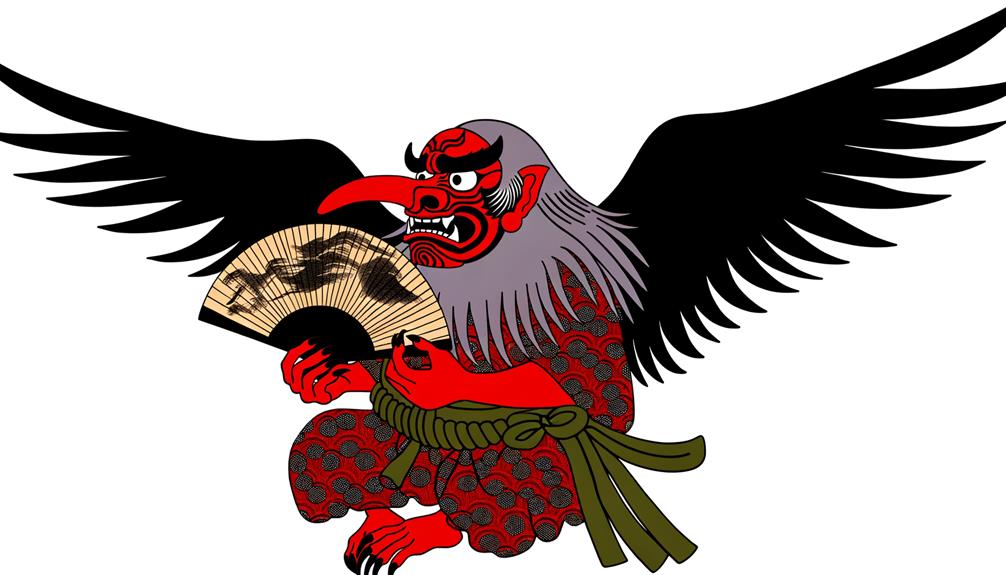
Let's chat about the intriguing physical features of Tengu, a creature from Japanese mythology. Tengu are a fascinating mix of human, bird, and even monkey attributes, often shown with a red face or a notably large or stretched-out nose. This distinctive mixture adds to their supernatural charm and beyond-the-natural-world existence.
Here are some remarkable traits:
- The famous long nose, usually the highlight of any Tengu mask.
- Their red faces, denoting their mystical origin and standing.
- The Tengu's feather fan, commonly shown in their hands, serving to whip up strong winds.
But these physical attributes aren't just for aesthetics; they echo the Tengu's spiritual practices and their link to Shugendō, a type of mountain worship. This bond frequently appears in the form of the yamabushi clothing, which mountain hermits wear, and is also often donned by the Tengu.
Early Japanese artwork offers us a peek at their varied looks, from fearsome birds to beings with human-like features. These different portrayals, from bird-like to human-esque, affirm the ever-changing and supernatural character of the Tengu, making them an incredibly engaging character in Japanese folklore.
Tengu in Japanese Mythology
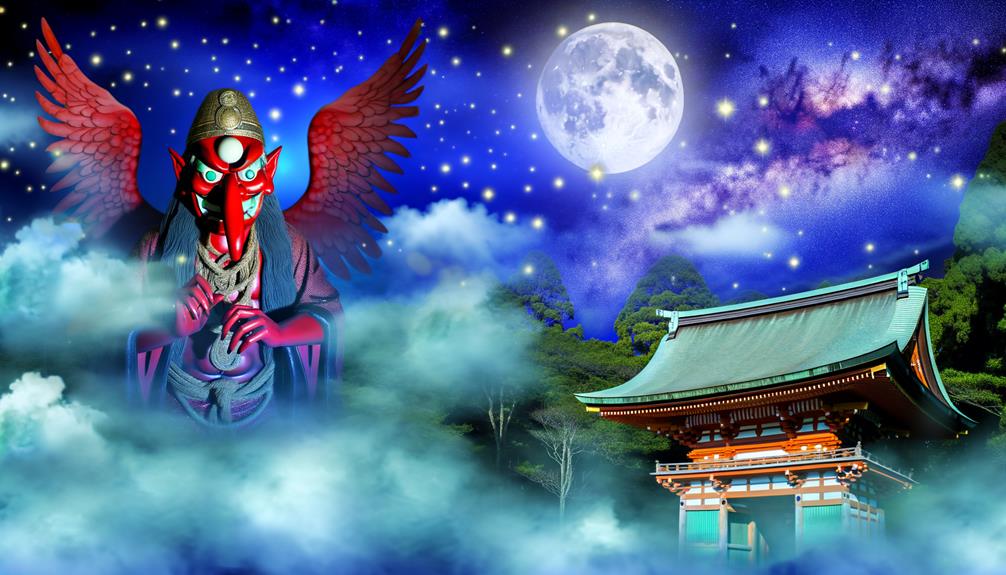
So, you've heard about Tengu, right? These characters from Japanese mythology are a fascinating bunch, let me tell you! What's so special about them, you ask? Well, they're a bit of a mixed bag – they can be disruptive to Buddhism, but at the same time, they're also seen as protectors. It's this mix of traits that makes them so intriguing.
Tengu are known to be a bit cheeky, leading the virtuous astray and attempting to tempt holy men. But hold on, there's another side to them! They're also viewed as protective spirits in Japanese mythology, especially in the practice of Shugendō.
To help you understand this a bit better, let's look at the following breakdown:
| Not-so-great Traits | Pretty Cool Traits |
|---|---|
| Leads the virtuous astray | Protectors in Shugendō |
| Tempters of holy men | Heroes in folklore |
| Temple thieves | Linked with skilled combat |
| Cheeky pranksters | Causes of mysterious happenings |
Tengu's Influence on Martial Arts
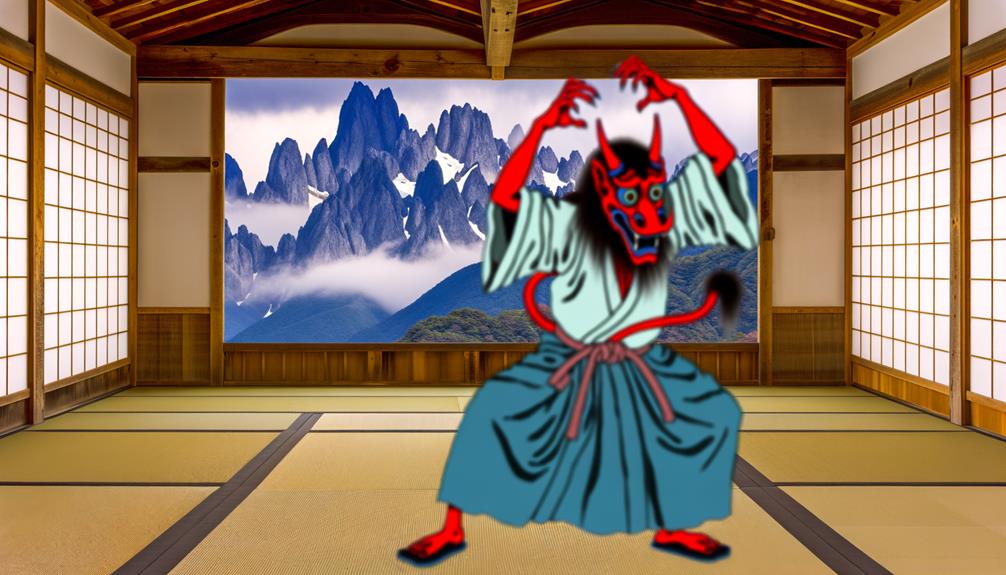
Let's take a casual stroll into the nucleus of Japan's martial arts history. Here, we stumble upon the mighty influence of Tengu, respected as champions of swordsmanship and teachers to the deserving. They've left a significant imprint on martial arts, notably through the story of Minamoto no Yoshitsune. According to the tale, it was the Tengu King on Mount Kurama who honed Yoshitsune's remarkable sword skills.
To sketch a picture of their influence, think about these points:
- Their weight on martial arts folklore:
- The story of Minamoto no Yoshitsune is a standout example of Tengu as teachers.
- This legend paints a picture of Tengu guiding the development of top-notch fighting skills, solidifying their place as martial arts champions.
- Their portrayal in art and culture:
- Tengu are often shown in ukiyo-e art, demonstrating martial arts, which underscores their influence.
- Their evolution from birdlike creatures to human-like figures during the Edo period signifies their esteemed status and connection with adept combat.
Tengu's Role in Modern Culture
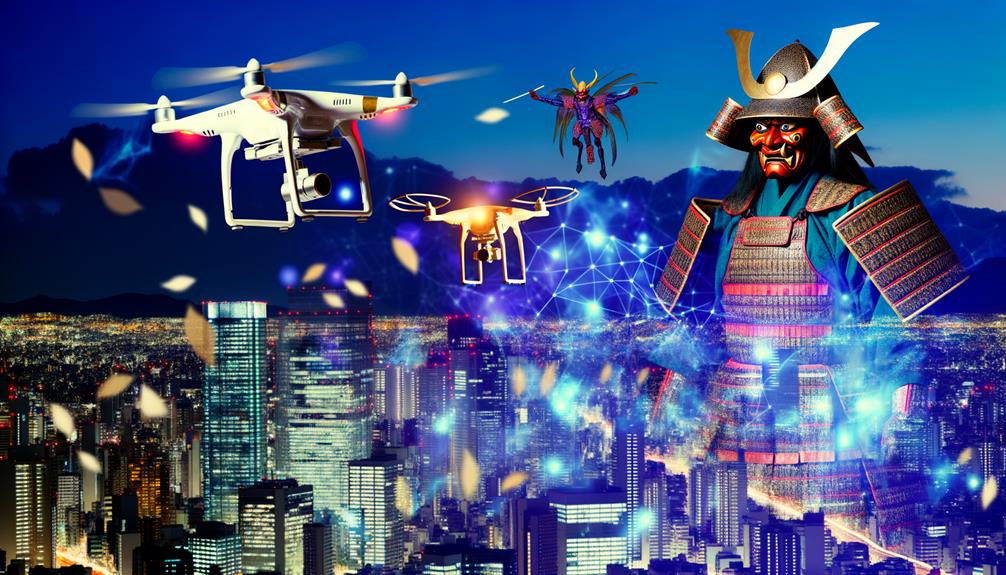
In today's Japanese culture, Tengu's presence is notable, blending in the mystical side of life with regular, day-to-day experiences. These semi-divine beings from the folklore of Japan have evolved from bird-like monsters into figures more similar to humans, with their identifying feature being large noses and red faces.
This change speaks volumes about the role of Tengu in today's society. They are frequently linked to the mountain-based ascetic practices of Shugendō. This connection subtly infuses the Japanese mindset with a respect for the spirit of nature. Tengu have become a well-known entity in the popular mindset through their portrayal in traditional arts, appearing in manga and anime series like 'Demon Slayer.'
Tengu's roles, ranging from protectors to mischief-makers, emphasize their dual nature. This dual nature mirrors our own human complexities. As proponents of martial arts, they symbolize skill and discipline, sparking numerous stories of their expertise in sword fighting. This ongoing influence shows the ability of a culture to blend the mystical with the everyday, highlighting the distinctive mix of old and new that marks Japanese culture.
Frequently Asked Questions
What Are the Mythical Creatures Tengu?
Have you ever heard about Tengu? They're these fascinating beings from Japanese folklore, a blend of human and bird-like characteristics. It's interesting how they have a reputation for being skilled in martial arts. But don't be fooled, they aren't just about fighting. Tengu can be seen as protective deities, yet they can also be harmful spirits. It's intriguing how these mythical figures have had such a profound impact on Japanese culture, don't you think?
What Are the Powers of Tengu?
Being a Tengu, I possess some pretty incredible qualities. For starters, I can fly – just like that, up into the sky, no wings needed! I can also control the wind. Imagine that, having the power to command the very air around you. And when it comes to strength, well, let's just say I'm quite a bit stronger than your average individual. Now, where I really shine is in my swordsmanship. I've got skills with a blade that are nothing short of legendary. In the world of Japanese mythology, I'm known as a fearsome warrior spirit.
Are Tengu Good or Evil?
Alright, let's chat about Tengu, shall we? They're not just black and white, good or evil. They come with a bit of a mix, having both a playful side and a more protective one. Interestingly, they pose challenges to Buddhism but are still worshipped like gods. Morally, they're not easy to pin down, which is a testament to their varied roles in the stories and legends of Japan.
Who Is the God of Tengu?
So, you're curious about who the god of Tengu is in Japanese folklore? Well, it's not quite that simple. You see, Tengus aren't really ruled by a specific god. Instead, they're mythical creatures or spirits themselves. These guys are often portrayed as both guardians and pranksters, symbolizing a mix of good and bad traits. It's a fascinating concept, isn't it?

